Professional Nursing Practice: A Detailed Case Study on Forgery Ethics
VerifiedAdded on 2023/06/12
|9
|2769
|193
Case Study
AI Summary
This case study examines the ethical dilemma of a nursing student being asked to forge a classmate's signature on an attendance sheet. It applies Kantian philosophy to argue against the act, emphasizing the importance of moral duty and good motives. The analysis extends to legal and professional standards, citing the ICN Code of Ethics for Nurses, Australian Registered Nurse Standards for Practice, and the Code of Professional Conduct for nurses, all of which prohibit forgery. The study also references Section 253 of the Crimes Act 1900 (NSW), which defines forgery as a crime. Further, it explores the legal consequences of forgery, media insights on the issue, and relevant research on fraud and corruption. The case underscores the importance of ethical decision-making in nursing and the potential legal ramifications of unethical actions. The solution emphasizes that reporting such an act is crucial to upholding professional standards and preventing future occurrences. Desklib offers similar solved assignments and past papers for students.
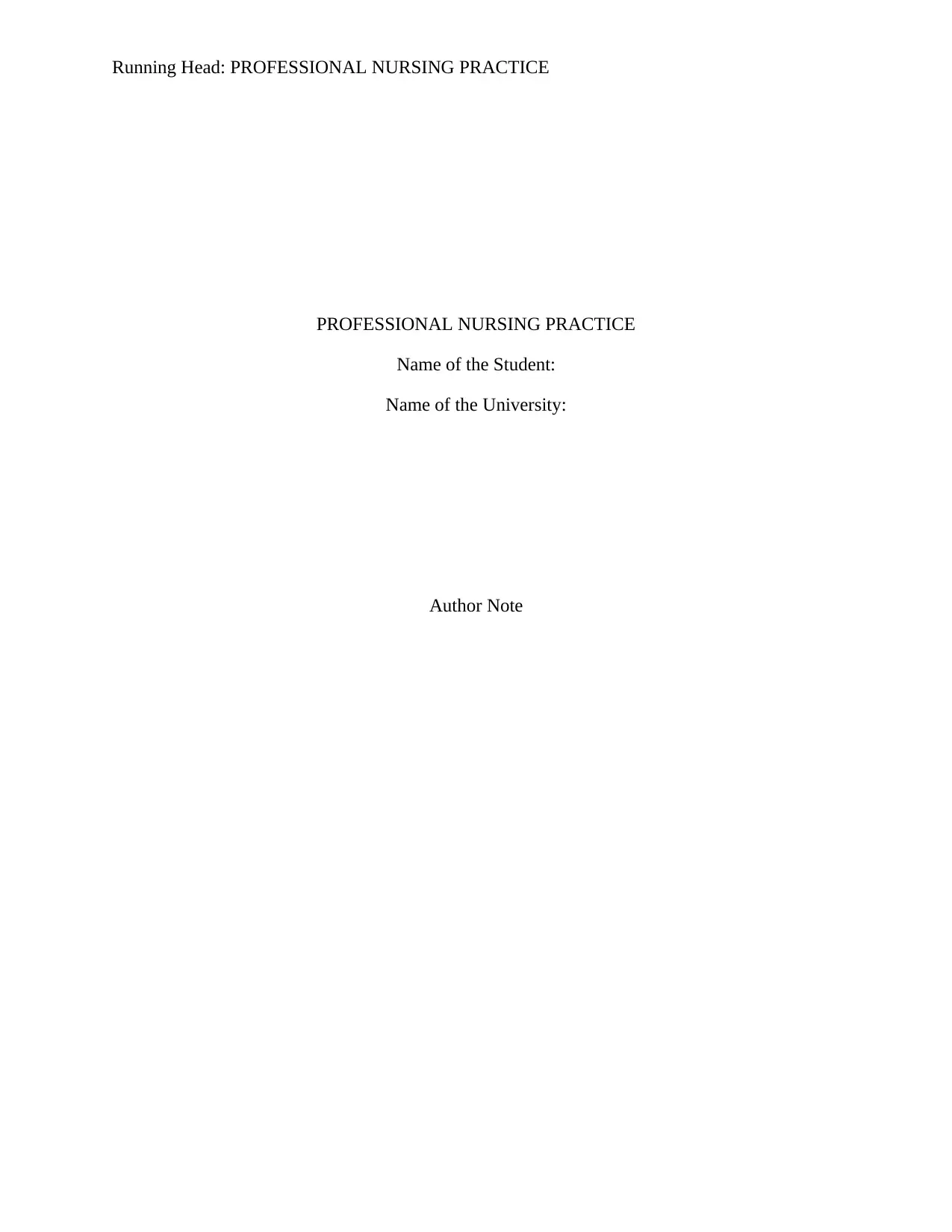
Running Head: PROFESSIONAL NURSING PRACTICE
PROFESSIONAL NURSING PRACTICE
Name of the Student:
Name of the University:
Author Note
PROFESSIONAL NURSING PRACTICE
Name of the Student:
Name of the University:
Author Note
Paraphrase This Document
Need a fresh take? Get an instant paraphrase of this document with our AI Paraphraser
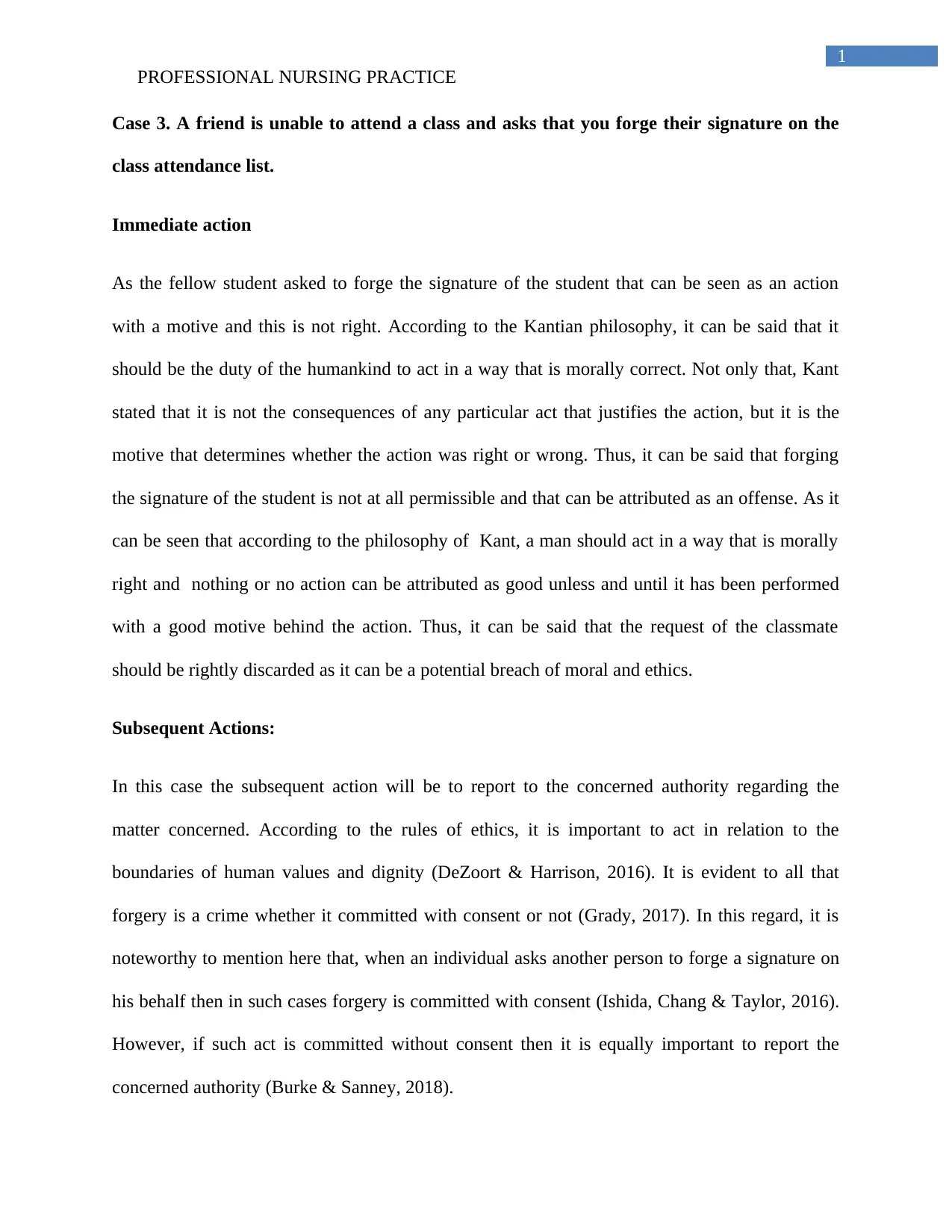
1
PROFESSIONAL NURSING PRACTICE
Case 3. A friend is unable to attend a class and asks that you forge their signature on the
class attendance list.
Immediate action
As the fellow student asked to forge the signature of the student that can be seen as an action
with a motive and this is not right. According to the Kantian philosophy, it can be said that it
should be the duty of the humankind to act in a way that is morally correct. Not only that, Kant
stated that it is not the consequences of any particular act that justifies the action, but it is the
motive that determines whether the action was right or wrong. Thus, it can be said that forging
the signature of the student is not at all permissible and that can be attributed as an offense. As it
can be seen that according to the philosophy of Kant, a man should act in a way that is morally
right and nothing or no action can be attributed as good unless and until it has been performed
with a good motive behind the action. Thus, it can be said that the request of the classmate
should be rightly discarded as it can be a potential breach of moral and ethics.
Subsequent Actions:
In this case the subsequent action will be to report to the concerned authority regarding the
matter concerned. According to the rules of ethics, it is important to act in relation to the
boundaries of human values and dignity (DeZoort & Harrison, 2016). It is evident to all that
forgery is a crime whether it committed with consent or not (Grady, 2017). In this regard, it is
noteworthy to mention here that, when an individual asks another person to forge a signature on
his behalf then in such cases forgery is committed with consent (Ishida, Chang & Taylor, 2016).
However, if such act is committed without consent then it is equally important to report the
concerned authority (Burke & Sanney, 2018).
PROFESSIONAL NURSING PRACTICE
Case 3. A friend is unable to attend a class and asks that you forge their signature on the
class attendance list.
Immediate action
As the fellow student asked to forge the signature of the student that can be seen as an action
with a motive and this is not right. According to the Kantian philosophy, it can be said that it
should be the duty of the humankind to act in a way that is morally correct. Not only that, Kant
stated that it is not the consequences of any particular act that justifies the action, but it is the
motive that determines whether the action was right or wrong. Thus, it can be said that forging
the signature of the student is not at all permissible and that can be attributed as an offense. As it
can be seen that according to the philosophy of Kant, a man should act in a way that is morally
right and nothing or no action can be attributed as good unless and until it has been performed
with a good motive behind the action. Thus, it can be said that the request of the classmate
should be rightly discarded as it can be a potential breach of moral and ethics.
Subsequent Actions:
In this case the subsequent action will be to report to the concerned authority regarding the
matter concerned. According to the rules of ethics, it is important to act in relation to the
boundaries of human values and dignity (DeZoort & Harrison, 2016). It is evident to all that
forgery is a crime whether it committed with consent or not (Grady, 2017). In this regard, it is
noteworthy to mention here that, when an individual asks another person to forge a signature on
his behalf then in such cases forgery is committed with consent (Ishida, Chang & Taylor, 2016).
However, if such act is committed without consent then it is equally important to report the
concerned authority (Burke & Sanney, 2018).
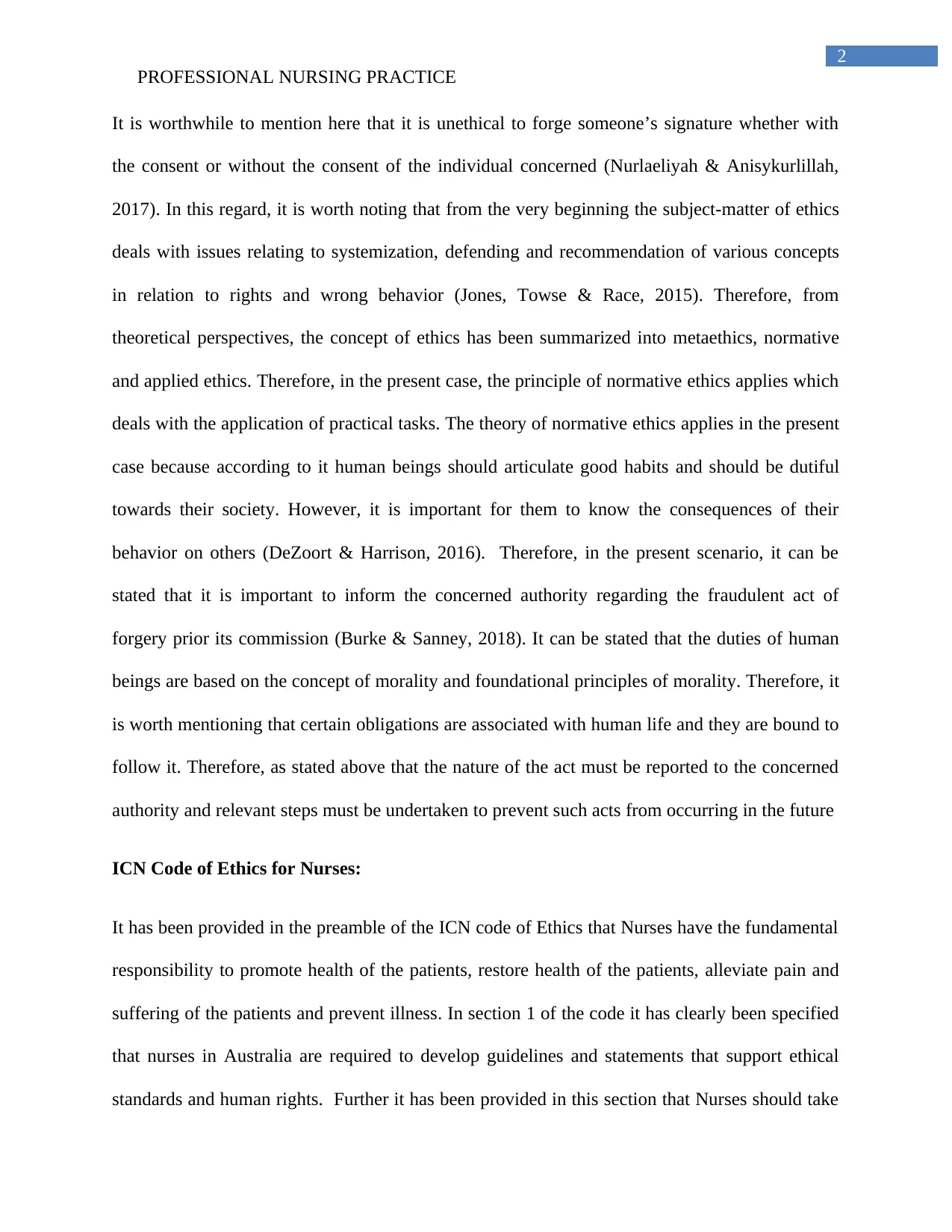
2
PROFESSIONAL NURSING PRACTICE
It is worthwhile to mention here that it is unethical to forge someone’s signature whether with
the consent or without the consent of the individual concerned (Nurlaeliyah & Anisykurlillah,
2017). In this regard, it is worth noting that from the very beginning the subject-matter of ethics
deals with issues relating to systemization, defending and recommendation of various concepts
in relation to rights and wrong behavior (Jones, Towse & Race, 2015). Therefore, from
theoretical perspectives, the concept of ethics has been summarized into metaethics, normative
and applied ethics. Therefore, in the present case, the principle of normative ethics applies which
deals with the application of practical tasks. The theory of normative ethics applies in the present
case because according to it human beings should articulate good habits and should be dutiful
towards their society. However, it is important for them to know the consequences of their
behavior on others (DeZoort & Harrison, 2016). Therefore, in the present scenario, it can be
stated that it is important to inform the concerned authority regarding the fraudulent act of
forgery prior its commission (Burke & Sanney, 2018). It can be stated that the duties of human
beings are based on the concept of morality and foundational principles of morality. Therefore, it
is worth mentioning that certain obligations are associated with human life and they are bound to
follow it. Therefore, as stated above that the nature of the act must be reported to the concerned
authority and relevant steps must be undertaken to prevent such acts from occurring in the future
ICN Code of Ethics for Nurses:
It has been provided in the preamble of the ICN code of Ethics that Nurses have the fundamental
responsibility to promote health of the patients, restore health of the patients, alleviate pain and
suffering of the patients and prevent illness. In section 1 of the code it has clearly been specified
that nurses in Australia are required to develop guidelines and statements that support ethical
standards and human rights. Further it has been provided in this section that Nurses should take
PROFESSIONAL NURSING PRACTICE
It is worthwhile to mention here that it is unethical to forge someone’s signature whether with
the consent or without the consent of the individual concerned (Nurlaeliyah & Anisykurlillah,
2017). In this regard, it is worth noting that from the very beginning the subject-matter of ethics
deals with issues relating to systemization, defending and recommendation of various concepts
in relation to rights and wrong behavior (Jones, Towse & Race, 2015). Therefore, from
theoretical perspectives, the concept of ethics has been summarized into metaethics, normative
and applied ethics. Therefore, in the present case, the principle of normative ethics applies which
deals with the application of practical tasks. The theory of normative ethics applies in the present
case because according to it human beings should articulate good habits and should be dutiful
towards their society. However, it is important for them to know the consequences of their
behavior on others (DeZoort & Harrison, 2016). Therefore, in the present scenario, it can be
stated that it is important to inform the concerned authority regarding the fraudulent act of
forgery prior its commission (Burke & Sanney, 2018). It can be stated that the duties of human
beings are based on the concept of morality and foundational principles of morality. Therefore, it
is worth mentioning that certain obligations are associated with human life and they are bound to
follow it. Therefore, as stated above that the nature of the act must be reported to the concerned
authority and relevant steps must be undertaken to prevent such acts from occurring in the future
ICN Code of Ethics for Nurses:
It has been provided in the preamble of the ICN code of Ethics that Nurses have the fundamental
responsibility to promote health of the patients, restore health of the patients, alleviate pain and
suffering of the patients and prevent illness. In section 1 of the code it has clearly been specified
that nurses in Australia are required to develop guidelines and statements that support ethical
standards and human rights. Further it has been provided in this section that Nurses should take
⊘ This is a preview!⊘
Do you want full access?
Subscribe today to unlock all pages.

Trusted by 1+ million students worldwide
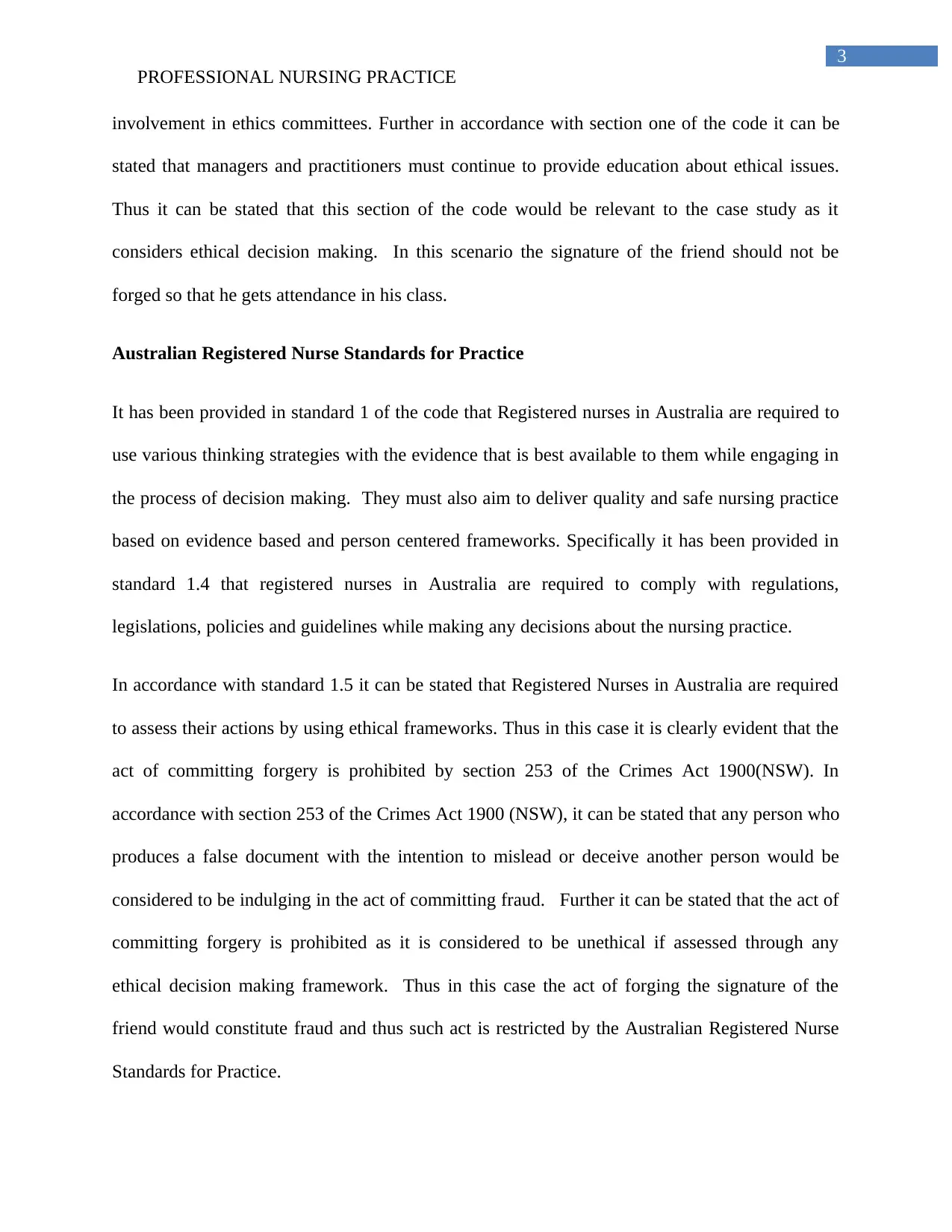
3
PROFESSIONAL NURSING PRACTICE
involvement in ethics committees. Further in accordance with section one of the code it can be
stated that managers and practitioners must continue to provide education about ethical issues.
Thus it can be stated that this section of the code would be relevant to the case study as it
considers ethical decision making. In this scenario the signature of the friend should not be
forged so that he gets attendance in his class.
Australian Registered Nurse Standards for Practice
It has been provided in standard 1 of the code that Registered nurses in Australia are required to
use various thinking strategies with the evidence that is best available to them while engaging in
the process of decision making. They must also aim to deliver quality and safe nursing practice
based on evidence based and person centered frameworks. Specifically it has been provided in
standard 1.4 that registered nurses in Australia are required to comply with regulations,
legislations, policies and guidelines while making any decisions about the nursing practice.
In accordance with standard 1.5 it can be stated that Registered Nurses in Australia are required
to assess their actions by using ethical frameworks. Thus in this case it is clearly evident that the
act of committing forgery is prohibited by section 253 of the Crimes Act 1900(NSW). In
accordance with section 253 of the Crimes Act 1900 (NSW), it can be stated that any person who
produces a false document with the intention to mislead or deceive another person would be
considered to be indulging in the act of committing fraud. Further it can be stated that the act of
committing forgery is prohibited as it is considered to be unethical if assessed through any
ethical decision making framework. Thus in this case the act of forging the signature of the
friend would constitute fraud and thus such act is restricted by the Australian Registered Nurse
Standards for Practice.
PROFESSIONAL NURSING PRACTICE
involvement in ethics committees. Further in accordance with section one of the code it can be
stated that managers and practitioners must continue to provide education about ethical issues.
Thus it can be stated that this section of the code would be relevant to the case study as it
considers ethical decision making. In this scenario the signature of the friend should not be
forged so that he gets attendance in his class.
Australian Registered Nurse Standards for Practice
It has been provided in standard 1 of the code that Registered nurses in Australia are required to
use various thinking strategies with the evidence that is best available to them while engaging in
the process of decision making. They must also aim to deliver quality and safe nursing practice
based on evidence based and person centered frameworks. Specifically it has been provided in
standard 1.4 that registered nurses in Australia are required to comply with regulations,
legislations, policies and guidelines while making any decisions about the nursing practice.
In accordance with standard 1.5 it can be stated that Registered Nurses in Australia are required
to assess their actions by using ethical frameworks. Thus in this case it is clearly evident that the
act of committing forgery is prohibited by section 253 of the Crimes Act 1900(NSW). In
accordance with section 253 of the Crimes Act 1900 (NSW), it can be stated that any person who
produces a false document with the intention to mislead or deceive another person would be
considered to be indulging in the act of committing fraud. Further it can be stated that the act of
committing forgery is prohibited as it is considered to be unethical if assessed through any
ethical decision making framework. Thus in this case the act of forging the signature of the
friend would constitute fraud and thus such act is restricted by the Australian Registered Nurse
Standards for Practice.
Paraphrase This Document
Need a fresh take? Get an instant paraphrase of this document with our AI Paraphraser
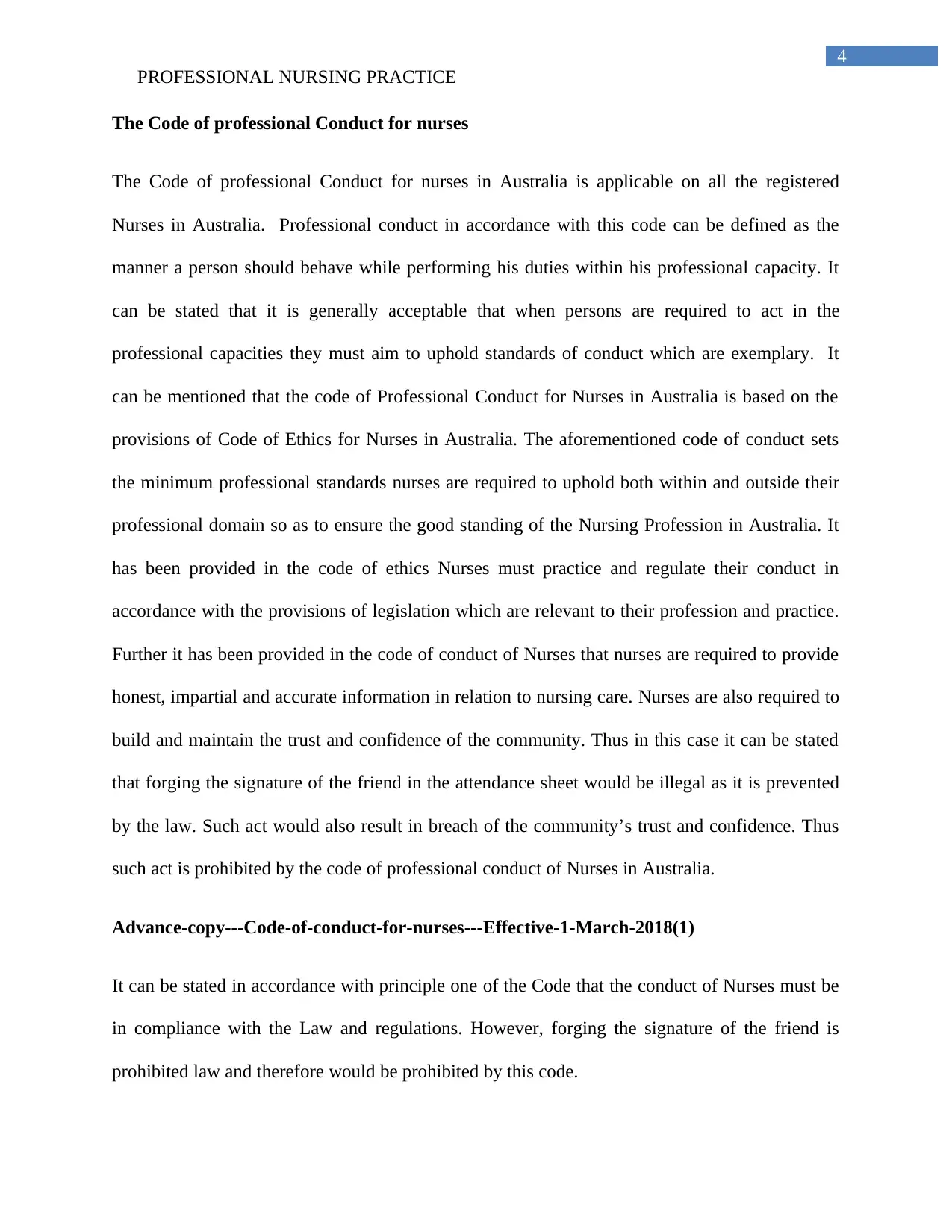
4
PROFESSIONAL NURSING PRACTICE
The Code of professional Conduct for nurses
The Code of professional Conduct for nurses in Australia is applicable on all the registered
Nurses in Australia. Professional conduct in accordance with this code can be defined as the
manner a person should behave while performing his duties within his professional capacity. It
can be stated that it is generally acceptable that when persons are required to act in the
professional capacities they must aim to uphold standards of conduct which are exemplary. It
can be mentioned that the code of Professional Conduct for Nurses in Australia is based on the
provisions of Code of Ethics for Nurses in Australia. The aforementioned code of conduct sets
the minimum professional standards nurses are required to uphold both within and outside their
professional domain so as to ensure the good standing of the Nursing Profession in Australia. It
has been provided in the code of ethics Nurses must practice and regulate their conduct in
accordance with the provisions of legislation which are relevant to their profession and practice.
Further it has been provided in the code of conduct of Nurses that nurses are required to provide
honest, impartial and accurate information in relation to nursing care. Nurses are also required to
build and maintain the trust and confidence of the community. Thus in this case it can be stated
that forging the signature of the friend in the attendance sheet would be illegal as it is prevented
by the law. Such act would also result in breach of the community’s trust and confidence. Thus
such act is prohibited by the code of professional conduct of Nurses in Australia.
Advance-copy---Code-of-conduct-for-nurses---Effective-1-March-2018(1)
It can be stated in accordance with principle one of the Code that the conduct of Nurses must be
in compliance with the Law and regulations. However, forging the signature of the friend is
prohibited law and therefore would be prohibited by this code.
PROFESSIONAL NURSING PRACTICE
The Code of professional Conduct for nurses
The Code of professional Conduct for nurses in Australia is applicable on all the registered
Nurses in Australia. Professional conduct in accordance with this code can be defined as the
manner a person should behave while performing his duties within his professional capacity. It
can be stated that it is generally acceptable that when persons are required to act in the
professional capacities they must aim to uphold standards of conduct which are exemplary. It
can be mentioned that the code of Professional Conduct for Nurses in Australia is based on the
provisions of Code of Ethics for Nurses in Australia. The aforementioned code of conduct sets
the minimum professional standards nurses are required to uphold both within and outside their
professional domain so as to ensure the good standing of the Nursing Profession in Australia. It
has been provided in the code of ethics Nurses must practice and regulate their conduct in
accordance with the provisions of legislation which are relevant to their profession and practice.
Further it has been provided in the code of conduct of Nurses that nurses are required to provide
honest, impartial and accurate information in relation to nursing care. Nurses are also required to
build and maintain the trust and confidence of the community. Thus in this case it can be stated
that forging the signature of the friend in the attendance sheet would be illegal as it is prevented
by the law. Such act would also result in breach of the community’s trust and confidence. Thus
such act is prohibited by the code of professional conduct of Nurses in Australia.
Advance-copy---Code-of-conduct-for-nurses---Effective-1-March-2018(1)
It can be stated in accordance with principle one of the Code that the conduct of Nurses must be
in compliance with the Law and regulations. However, forging the signature of the friend is
prohibited law and therefore would be prohibited by this code.
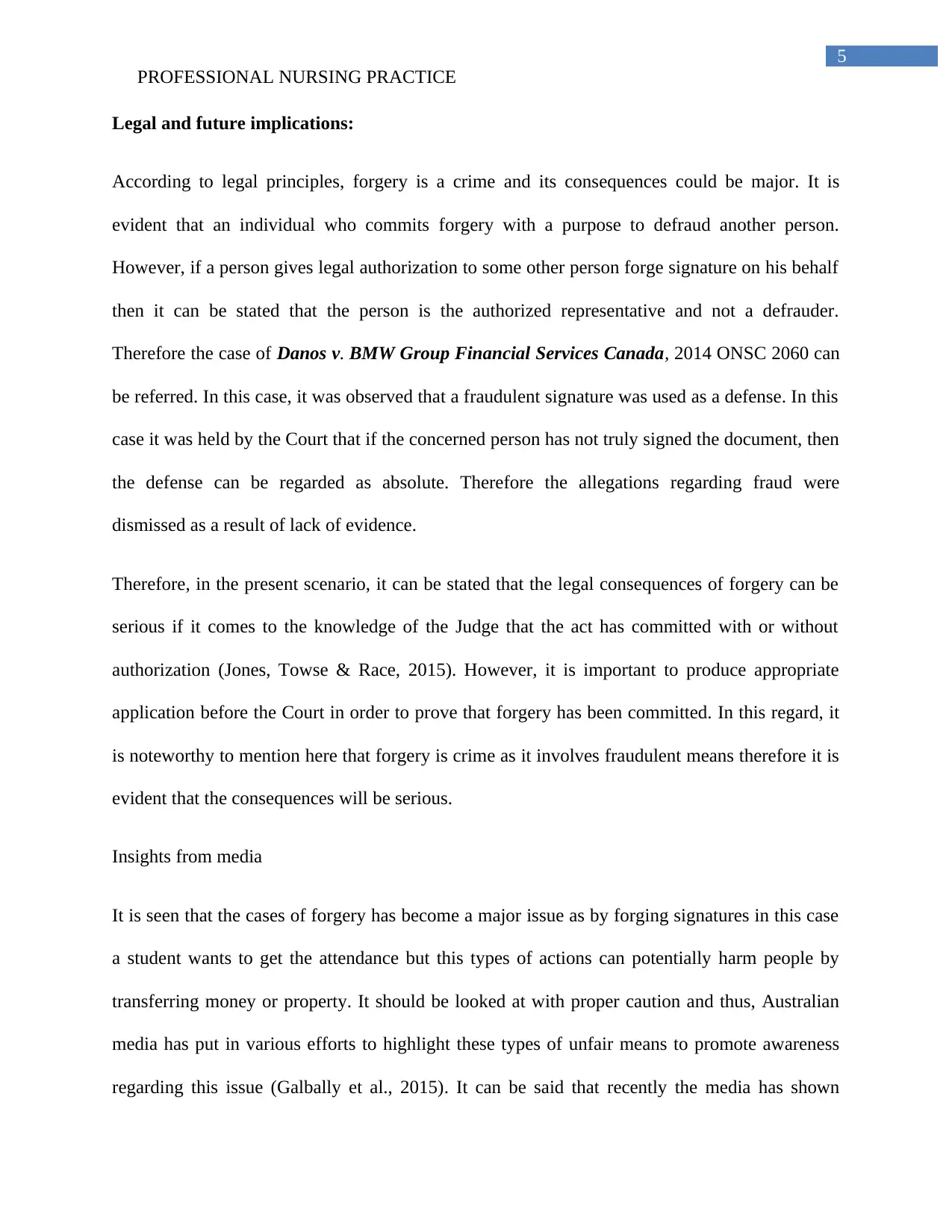
5
PROFESSIONAL NURSING PRACTICE
Legal and future implications:
According to legal principles, forgery is a crime and its consequences could be major. It is
evident that an individual who commits forgery with a purpose to defraud another person.
However, if a person gives legal authorization to some other person forge signature on his behalf
then it can be stated that the person is the authorized representative and not a defrauder.
Therefore the case of Danos v. BMW Group Financial Services Canada, 2014 ONSC 2060 can
be referred. In this case, it was observed that a fraudulent signature was used as a defense. In this
case it was held by the Court that if the concerned person has not truly signed the document, then
the defense can be regarded as absolute. Therefore the allegations regarding fraud were
dismissed as a result of lack of evidence.
Therefore, in the present scenario, it can be stated that the legal consequences of forgery can be
serious if it comes to the knowledge of the Judge that the act has committed with or without
authorization (Jones, Towse & Race, 2015). However, it is important to produce appropriate
application before the Court in order to prove that forgery has been committed. In this regard, it
is noteworthy to mention here that forgery is crime as it involves fraudulent means therefore it is
evident that the consequences will be serious.
Insights from media
It is seen that the cases of forgery has become a major issue as by forging signatures in this case
a student wants to get the attendance but this types of actions can potentially harm people by
transferring money or property. It should be looked at with proper caution and thus, Australian
media has put in various efforts to highlight these types of unfair means to promote awareness
regarding this issue (Galbally et al., 2015). It can be said that recently the media has shown
PROFESSIONAL NURSING PRACTICE
Legal and future implications:
According to legal principles, forgery is a crime and its consequences could be major. It is
evident that an individual who commits forgery with a purpose to defraud another person.
However, if a person gives legal authorization to some other person forge signature on his behalf
then it can be stated that the person is the authorized representative and not a defrauder.
Therefore the case of Danos v. BMW Group Financial Services Canada, 2014 ONSC 2060 can
be referred. In this case, it was observed that a fraudulent signature was used as a defense. In this
case it was held by the Court that if the concerned person has not truly signed the document, then
the defense can be regarded as absolute. Therefore the allegations regarding fraud were
dismissed as a result of lack of evidence.
Therefore, in the present scenario, it can be stated that the legal consequences of forgery can be
serious if it comes to the knowledge of the Judge that the act has committed with or without
authorization (Jones, Towse & Race, 2015). However, it is important to produce appropriate
application before the Court in order to prove that forgery has been committed. In this regard, it
is noteworthy to mention here that forgery is crime as it involves fraudulent means therefore it is
evident that the consequences will be serious.
Insights from media
It is seen that the cases of forgery has become a major issue as by forging signatures in this case
a student wants to get the attendance but this types of actions can potentially harm people by
transferring money or property. It should be looked at with proper caution and thus, Australian
media has put in various efforts to highlight these types of unfair means to promote awareness
regarding this issue (Galbally et al., 2015). It can be said that recently the media has shown
⊘ This is a preview!⊘
Do you want full access?
Subscribe today to unlock all pages.

Trusted by 1+ million students worldwide
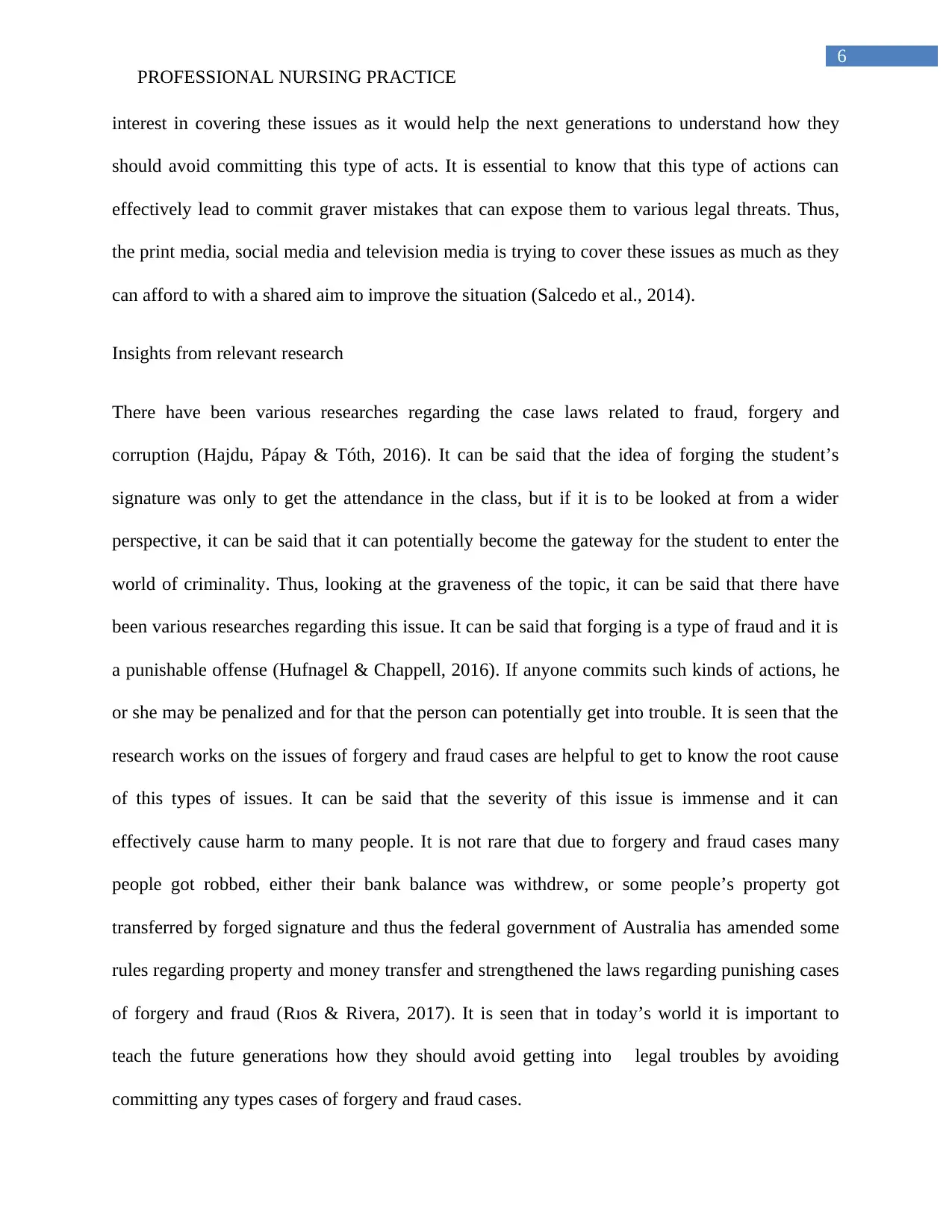
6
PROFESSIONAL NURSING PRACTICE
interest in covering these issues as it would help the next generations to understand how they
should avoid committing this type of acts. It is essential to know that this type of actions can
effectively lead to commit graver mistakes that can expose them to various legal threats. Thus,
the print media, social media and television media is trying to cover these issues as much as they
can afford to with a shared aim to improve the situation (Salcedo et al., 2014).
Insights from relevant research
There have been various researches regarding the case laws related to fraud, forgery and
corruption (Hajdu, Pápay & Tóth, 2016). It can be said that the idea of forging the student’s
signature was only to get the attendance in the class, but if it is to be looked at from a wider
perspective, it can be said that it can potentially become the gateway for the student to enter the
world of criminality. Thus, looking at the graveness of the topic, it can be said that there have
been various researches regarding this issue. It can be said that forging is a type of fraud and it is
a punishable offense (Hufnagel & Chappell, 2016). If anyone commits such kinds of actions, he
or she may be penalized and for that the person can potentially get into trouble. It is seen that the
research works on the issues of forgery and fraud cases are helpful to get to know the root cause
of this types of issues. It can be said that the severity of this issue is immense and it can
effectively cause harm to many people. It is not rare that due to forgery and fraud cases many
people got robbed, either their bank balance was withdrew, or some people’s property got
transferred by forged signature and thus the federal government of Australia has amended some
rules regarding property and money transfer and strengthened the laws regarding punishing cases
of forgery and fraud (Rıos & Rivera, 2017). It is seen that in today’s world it is important to
teach the future generations how they should avoid getting into legal troubles by avoiding
committing any types cases of forgery and fraud cases.
PROFESSIONAL NURSING PRACTICE
interest in covering these issues as it would help the next generations to understand how they
should avoid committing this type of acts. It is essential to know that this type of actions can
effectively lead to commit graver mistakes that can expose them to various legal threats. Thus,
the print media, social media and television media is trying to cover these issues as much as they
can afford to with a shared aim to improve the situation (Salcedo et al., 2014).
Insights from relevant research
There have been various researches regarding the case laws related to fraud, forgery and
corruption (Hajdu, Pápay & Tóth, 2016). It can be said that the idea of forging the student’s
signature was only to get the attendance in the class, but if it is to be looked at from a wider
perspective, it can be said that it can potentially become the gateway for the student to enter the
world of criminality. Thus, looking at the graveness of the topic, it can be said that there have
been various researches regarding this issue. It can be said that forging is a type of fraud and it is
a punishable offense (Hufnagel & Chappell, 2016). If anyone commits such kinds of actions, he
or she may be penalized and for that the person can potentially get into trouble. It is seen that the
research works on the issues of forgery and fraud cases are helpful to get to know the root cause
of this types of issues. It can be said that the severity of this issue is immense and it can
effectively cause harm to many people. It is not rare that due to forgery and fraud cases many
people got robbed, either their bank balance was withdrew, or some people’s property got
transferred by forged signature and thus the federal government of Australia has amended some
rules regarding property and money transfer and strengthened the laws regarding punishing cases
of forgery and fraud (Rıos & Rivera, 2017). It is seen that in today’s world it is important to
teach the future generations how they should avoid getting into legal troubles by avoiding
committing any types cases of forgery and fraud cases.
Paraphrase This Document
Need a fresh take? Get an instant paraphrase of this document with our AI Paraphraser
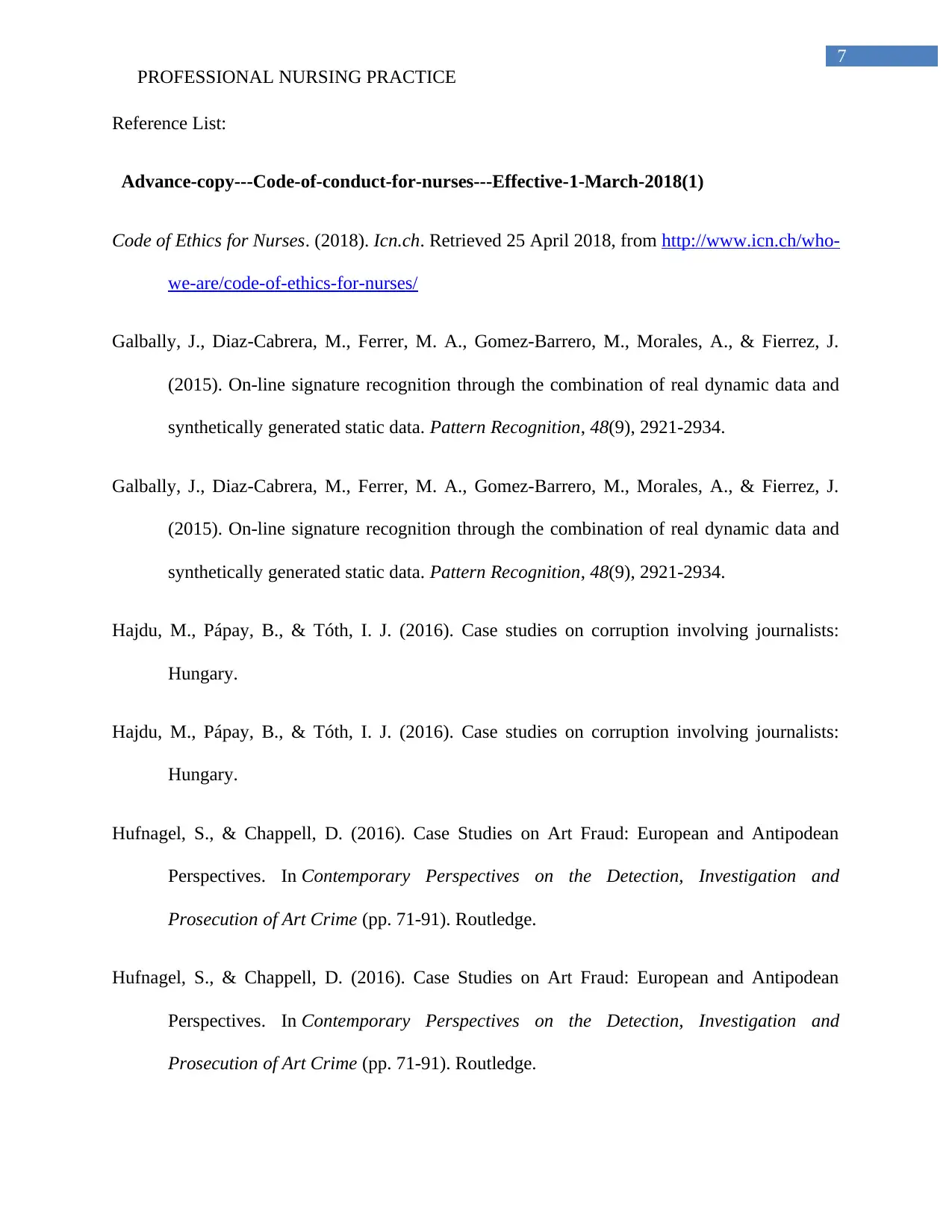
7
PROFESSIONAL NURSING PRACTICE
Reference List:
Advance-copy---Code-of-conduct-for-nurses---Effective-1-March-2018(1)
Code of Ethics for Nurses. (2018). Icn.ch. Retrieved 25 April 2018, from http://www.icn.ch/who-
we-are/code-of-ethics-for-nurses/
Galbally, J., Diaz-Cabrera, M., Ferrer, M. A., Gomez-Barrero, M., Morales, A., & Fierrez, J.
(2015). On-line signature recognition through the combination of real dynamic data and
synthetically generated static data. Pattern Recognition, 48(9), 2921-2934.
Galbally, J., Diaz-Cabrera, M., Ferrer, M. A., Gomez-Barrero, M., Morales, A., & Fierrez, J.
(2015). On-line signature recognition through the combination of real dynamic data and
synthetically generated static data. Pattern Recognition, 48(9), 2921-2934.
Hajdu, M., Pápay, B., & Tóth, I. J. (2016). Case studies on corruption involving journalists:
Hungary.
Hajdu, M., Pápay, B., & Tóth, I. J. (2016). Case studies on corruption involving journalists:
Hungary.
Hufnagel, S., & Chappell, D. (2016). Case Studies on Art Fraud: European and Antipodean
Perspectives. In Contemporary Perspectives on the Detection, Investigation and
Prosecution of Art Crime (pp. 71-91). Routledge.
Hufnagel, S., & Chappell, D. (2016). Case Studies on Art Fraud: European and Antipodean
Perspectives. In Contemporary Perspectives on the Detection, Investigation and
Prosecution of Art Crime (pp. 71-91). Routledge.
PROFESSIONAL NURSING PRACTICE
Reference List:
Advance-copy---Code-of-conduct-for-nurses---Effective-1-March-2018(1)
Code of Ethics for Nurses. (2018). Icn.ch. Retrieved 25 April 2018, from http://www.icn.ch/who-
we-are/code-of-ethics-for-nurses/
Galbally, J., Diaz-Cabrera, M., Ferrer, M. A., Gomez-Barrero, M., Morales, A., & Fierrez, J.
(2015). On-line signature recognition through the combination of real dynamic data and
synthetically generated static data. Pattern Recognition, 48(9), 2921-2934.
Galbally, J., Diaz-Cabrera, M., Ferrer, M. A., Gomez-Barrero, M., Morales, A., & Fierrez, J.
(2015). On-line signature recognition through the combination of real dynamic data and
synthetically generated static data. Pattern Recognition, 48(9), 2921-2934.
Hajdu, M., Pápay, B., & Tóth, I. J. (2016). Case studies on corruption involving journalists:
Hungary.
Hajdu, M., Pápay, B., & Tóth, I. J. (2016). Case studies on corruption involving journalists:
Hungary.
Hufnagel, S., & Chappell, D. (2016). Case Studies on Art Fraud: European and Antipodean
Perspectives. In Contemporary Perspectives on the Detection, Investigation and
Prosecution of Art Crime (pp. 71-91). Routledge.
Hufnagel, S., & Chappell, D. (2016). Case Studies on Art Fraud: European and Antipodean
Perspectives. In Contemporary Perspectives on the Detection, Investigation and
Prosecution of Art Crime (pp. 71-91). Routledge.
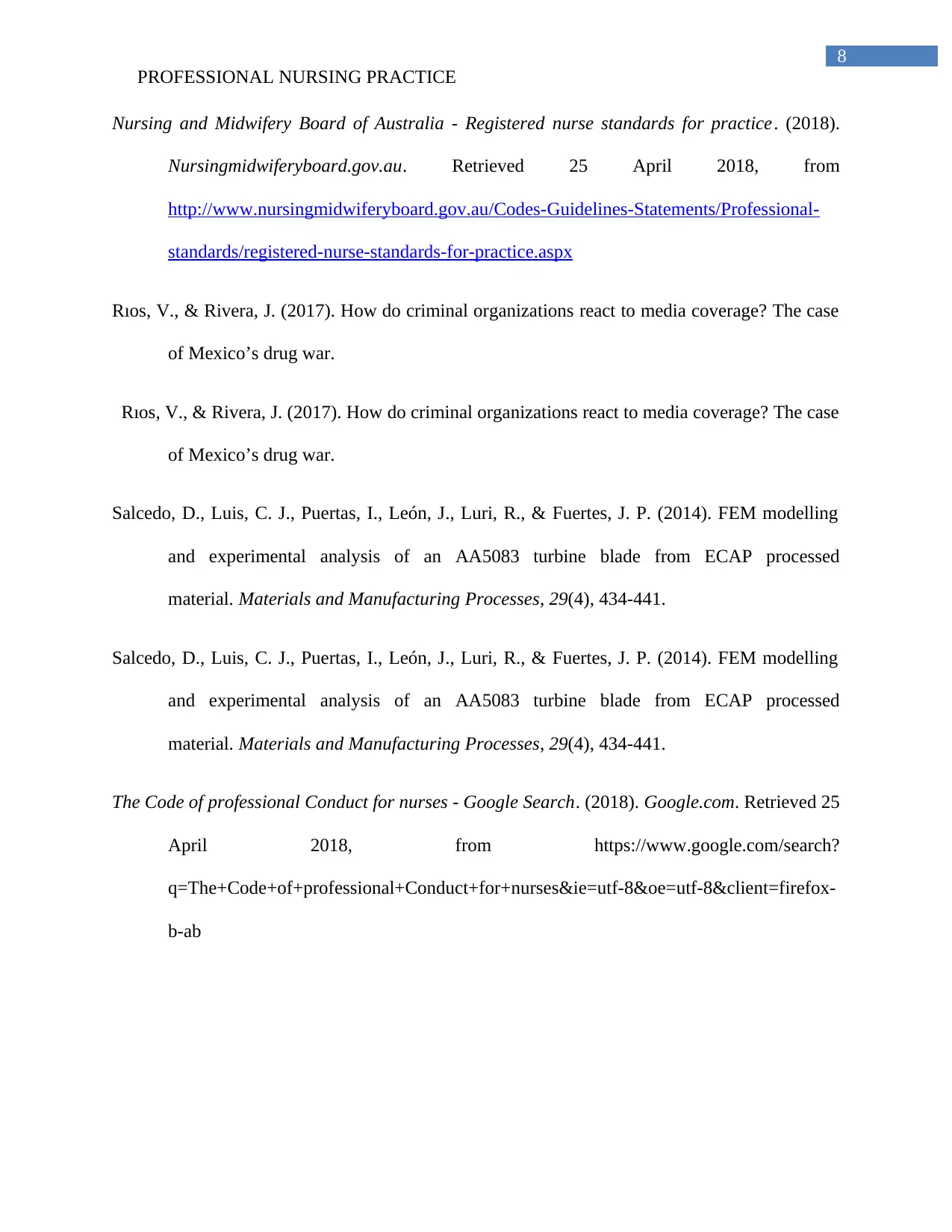
8
PROFESSIONAL NURSING PRACTICE
Nursing and Midwifery Board of Australia - Registered nurse standards for practice. (2018).
Nursingmidwiferyboard.gov.au. Retrieved 25 April 2018, from
http://www.nursingmidwiferyboard.gov.au/Codes-Guidelines-Statements/Professional-
standards/registered-nurse-standards-for-practice.aspx
Rıos, V., & Rivera, J. (2017). How do criminal organizations react to media coverage? The case
of Mexico’s drug war.
Rıos, V., & Rivera, J. (2017). How do criminal organizations react to media coverage? The case
of Mexico’s drug war.
Salcedo, D., Luis, C. J., Puertas, I., León, J., Luri, R., & Fuertes, J. P. (2014). FEM modelling
and experimental analysis of an AA5083 turbine blade from ECAP processed
material. Materials and Manufacturing Processes, 29(4), 434-441.
Salcedo, D., Luis, C. J., Puertas, I., León, J., Luri, R., & Fuertes, J. P. (2014). FEM modelling
and experimental analysis of an AA5083 turbine blade from ECAP processed
material. Materials and Manufacturing Processes, 29(4), 434-441.
The Code of professional Conduct for nurses - Google Search. (2018). Google.com. Retrieved 25
April 2018, from https://www.google.com/search?
q=The+Code+of+professional+Conduct+for+nurses&ie=utf-8&oe=utf-8&client=firefox-
b-ab
PROFESSIONAL NURSING PRACTICE
Nursing and Midwifery Board of Australia - Registered nurse standards for practice. (2018).
Nursingmidwiferyboard.gov.au. Retrieved 25 April 2018, from
http://www.nursingmidwiferyboard.gov.au/Codes-Guidelines-Statements/Professional-
standards/registered-nurse-standards-for-practice.aspx
Rıos, V., & Rivera, J. (2017). How do criminal organizations react to media coverage? The case
of Mexico’s drug war.
Rıos, V., & Rivera, J. (2017). How do criminal organizations react to media coverage? The case
of Mexico’s drug war.
Salcedo, D., Luis, C. J., Puertas, I., León, J., Luri, R., & Fuertes, J. P. (2014). FEM modelling
and experimental analysis of an AA5083 turbine blade from ECAP processed
material. Materials and Manufacturing Processes, 29(4), 434-441.
Salcedo, D., Luis, C. J., Puertas, I., León, J., Luri, R., & Fuertes, J. P. (2014). FEM modelling
and experimental analysis of an AA5083 turbine blade from ECAP processed
material. Materials and Manufacturing Processes, 29(4), 434-441.
The Code of professional Conduct for nurses - Google Search. (2018). Google.com. Retrieved 25
April 2018, from https://www.google.com/search?
q=The+Code+of+professional+Conduct+for+nurses&ie=utf-8&oe=utf-8&client=firefox-
b-ab
⊘ This is a preview!⊘
Do you want full access?
Subscribe today to unlock all pages.

Trusted by 1+ million students worldwide
1 out of 9
Related Documents
Your All-in-One AI-Powered Toolkit for Academic Success.
+13062052269
info@desklib.com
Available 24*7 on WhatsApp / Email
![[object Object]](/_next/static/media/star-bottom.7253800d.svg)
Unlock your academic potential
Copyright © 2020–2025 A2Z Services. All Rights Reserved. Developed and managed by ZUCOL.





